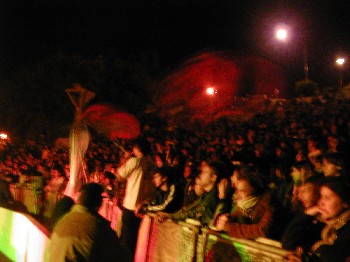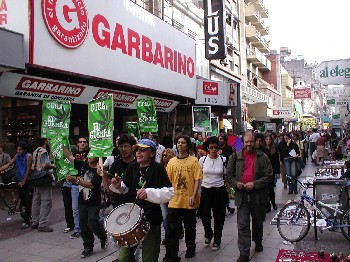Feature:
Million
Marijuana
Marches
Loom,
As
Do
Perennial
Questions
About
Their
Utility
4/21/06
For more than 30 years, advocates of marijuana legalization have marched in cities across the country and around the world on May Day (or the first weekend in May). This year is no different, with organizers anticipating rallies in more than 200 cities on the weekend of May 6-7. From Albuquerque to Amsterdam to Auckland, from Mexico City to Missoula to Moscow, and from Vancouver to Vienna to Vladivostock, the pro-pot contingent will be hitting the streets, holding rallies, and throwing concerts for the cause.
"Of course this year's theme is Free Marc Emery!" exclaimed Dana Beal of Cures Not Wars, which serves as the clearinghouse and coordination center for the global marches. "Marc supported all our affiliates for years, giving out money like water, and now he needs our help." While the marches around the world are naturally focused on marijuana, Beal has a broader vision. "Cures Not Wars is primarily harm reduction oriented," he said. "That's a course we've been on since 1980, when we got sick of the bickering between advocates of decriminalization and legalization. People were saying we should separate marijuana and hard drugs, and that's when we split off from everyone else. That was the beginning of our odyssey toward a full-blown harm reduction position," he said. Beal's particular crusade is the use of ibogaine as a treatment for chemical dependency. "We can cure 70% of junkies with ibograine," said Beal, coauthor of The Ibogaine Story. "That's real harm reduction. We're not just about legalizing pot." "The marches provide us with a platform to espouse a politics that is somewhat different from DPA or NORML," said Beal. "That's fine with us. We all serve our functions." For nearly as long as the marchers have been marching, critics have been criticizing. A common refrain in the Unites States is that a bunch of scruffy hippies -- especially teenagers -- marching and smoking dope in public is no way to win friends and influence people. This year is no different. In places where the politics of marijuana legalization has gone mainstream, such as Canada, where a majority say they are willing to take the leap, the time of the mass march or smoke-in may be past, said Marc-Boris St.-Maurice, who organized marches in Montreal in the past, but not anymore. "I will likely be there, but I think such tactics are no longer as useful as they were before," he told DRCNet. "It is now time to bring civility and respectability to the cause so the mainstream can feel more comfortable embracing it." In places where the social and cultural milieu is more conservative, the marches can be counterproductive, some activists said. "Put yourself in the head of a soccer mom, born-again Christian, or small-town bourgeois parent and think of what these images of longhairs, many of them young teenagers, straggling down the sidewalk with handmade signs proclaiming things about fascists and how getting high is good," said Nicky Eyle of the New York state-based drug reform group ReconsiDer. "Look how many shots there are of people getting arrested there are. I don't see how that is a message that is going to gain support amongst that huge segment of America," he told DRCNet. "I think there are plenty of messages that will resonate far better in the heartland." If it doesn't play in upstate New York, it certainly doesn't play in her neck of the woods either, said Denele Campbell, head of the Arkansas Alliance for Medical Marijuana. "At least here in the Bible Belt, these marches are counterproductive," she told DRCNet. "The only people willing to march are those with nothing to lose. This parade of a handful of 'undesirables' only hardens the negative public image surrounding the issue and makes it much harder for mainstream types to consider supporting reform," she told DRCNet. But that sentiment is by no means unanimous. "The idea of a global march is very good because it keeps motivating people to know we are millions," said Joep Oomen, the Brussels-based coordinator of the European Coalition for Just and Effective Drug Policies (ENCOD). "And cannabis is the strongest link in the drug policy reform movement since it involves the most people. If we stop marching, it means we are giving in to the status quo. Then those who continue to march become an easy target for stigmatization," he told DRCNet. "If we want to have an impact, we have to be an actor in the game, and we should have a message for politicians and the public," Oomen continued. "Showing how many people want an end to the war on drugs is important, and so is showing the benefits of legal regulation. The Million Marijuana Marches can do both, but they have to avoid becoming caricatures of our movement." Dominic Holden is a veteran former organizer of the Seattle Hempfest, probably the world's largest annual cannabis rally. About 150,000 people a day attend the two-day event each year. He also played a key role in Seattle's pioneering "lowest law enforcement priority" marijuana law.
But if ill-organized or not well thought-out, they can damage the movement, Holden said. "Poorly produced events fail to focus on the primary message and distract media and others to pay attention to insignificant details, such as the clothes people are wearing or issues that are only tangentially related," Holden said. "Other follies include failing to gather enough attendees or earn media coverage, which makes the movement appear weak or invisible. One of the most common mistakes made by speakers and organizers for marijuana events is focusing on friction with police, when the real opponents are lawmakers and misguided thinking." A poorly produced or though-out event can have a variety of negative repercussions, Holden warned. "At best, volunteers feel exhausted from the work and exasperated from failing to realize their goals, often leading to the deterioration of an organization and the atrophy of the movement," he noted. "At worst, the event showcases activists who appear to be self-serving caricatures of themselves -- more focused on speaking to each other than to the world -- resulting in the issue being marginalized or creating a backlash." The debate over the best tactics to take the movement forward will doubtless continue. In the meantime, the pot people will come out to have their day. In some places, there will be well-organized, well-attended focused events. In others, it'll be a handful of stoner kids and old hippies self-organizing in godforsaken places, their only connection to the broader drug reform movement a web site or two. This is the grass roots.
| ||||||||||||||||||||||||||||||||||||||||||||||||||||||||||||||||||||||||||||||||


